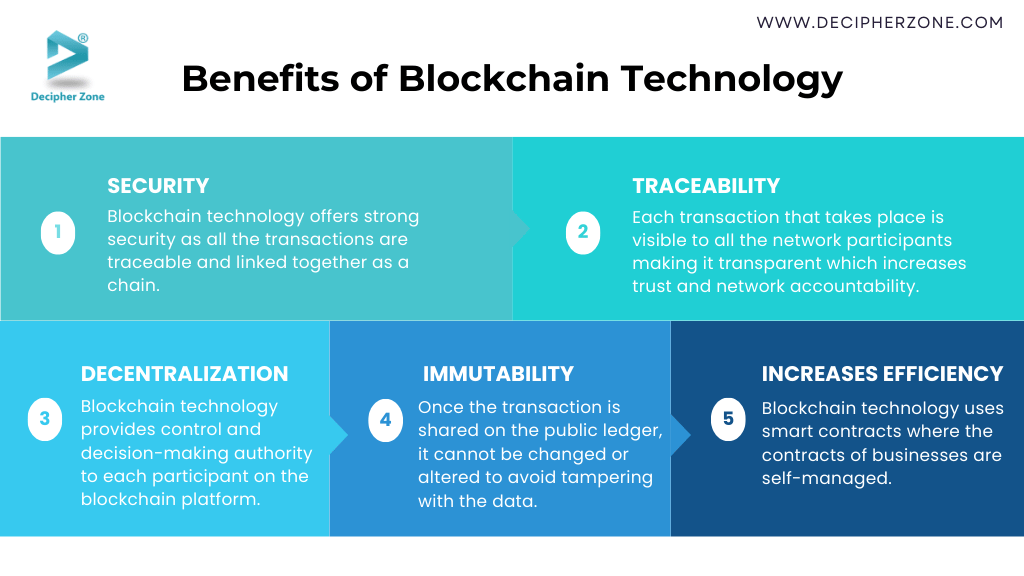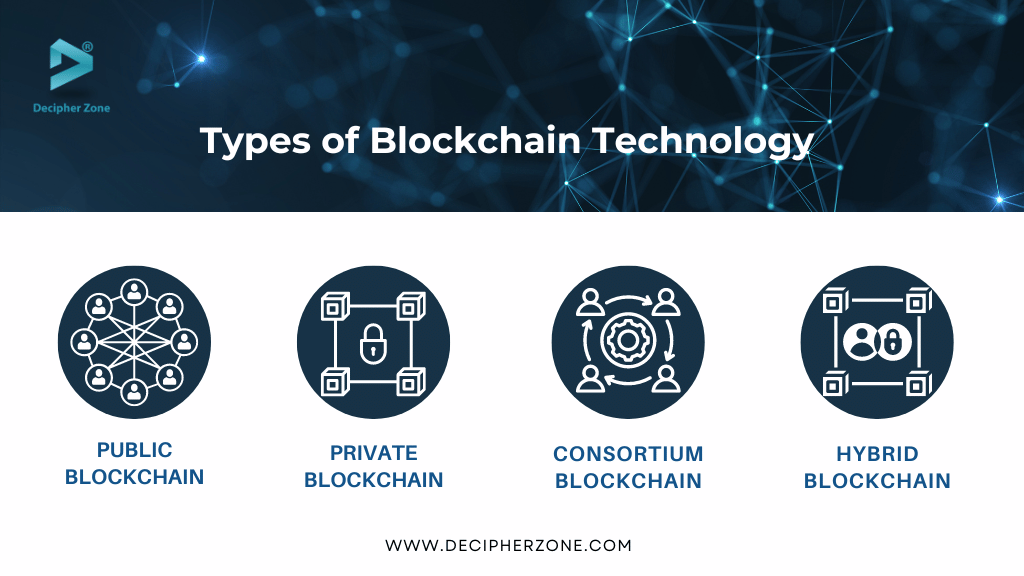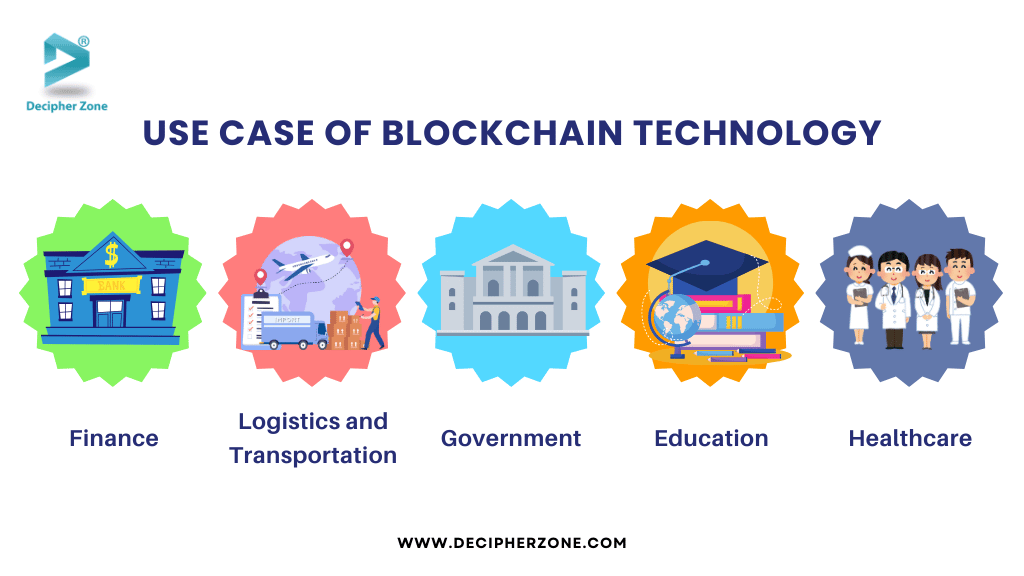An all-inclusive guide to blockchain technology: what it is, how it works, benefits of implementing blockchain, types of blockchain, practical use cases, barriers & solutions, blockchain evolution, blockchain solution development process, cost associated with its development, and more.
Blockchain technology is known as one of the leading trends in finance. If you’ve ever heard about Bitcoin? Well then, you are already on your way to know Blockchain technology.
Blockchain is ideal for software development as it’s the most secure technology where a user can completely rely on the matter of privacy and security. The concept of blockchain is wide and complex.
Blockchain is a digitalized ledger that records transactions and verifies them creating an impermeable environment by offering traceability with the information available on the blockchain platform.
What you will learn
-
An overview of what blockchain is all about,
-
How does blockchain work,
-
How many types of blockchain technology are available,
-
In what industries blockchain technology is used and how,
-
What are the challenges faced while implementing blockchain technology and its solutions,
-
What are the innovations and future trends of blockchain technology,
-
What are the impacts of blockchain technology on app development,
-
What is the blockchain solution development process,
-
What are the steps to choose a blockchain platform,
-
How much does a blockchain development cost?
What is Blockchain Technology?
Blockchain was first developed as a part of the Cryptocurrency system, but the adapting innovation and advanced technology it offers, provide high security and transparency to all its users. Basically, Blockchain technology is a distributed public ledger that maintains transparent information that stays reliable and unchanged. With the use of blockchain technology in software development the applications can be more secure with payments, tracking orders, and other transactions.
How does Blockchain Technology work?
Let’s get deep into how the blockchain technology works and secure the network. Blockchain is a distributed ledger that we all know but it is a distributed data management system where each transaction is recorded and verified by all the participants, making a trustless and intermediary-free system.
When a transaction is initiated, it becomes a Block. This block contains information and has a unique code known as Hash. These generated codes create a chronological sequence like a new block is generated from the older block’s hash. This makes the entire chain tamperproof. If any modification is made in the block, the entire chain gets affected which is easier for the participants to spot and reject misfit blocks. Blockchain allows a one-way operation, neglecting to reverse any action.
5 Benefits of Blockchain Technology Development
Blockchain technology offers various advantages to the software industry, below is the list:
-
Security,
-
Traceability,
-
Decentralization,
-
Immutability,
-
Increases Efficiency.

1. Security
Blockchain technology offers strong security as all the transactions are traceable and linked together as a chain. To boost security blockchain technology uses cryptographic techniques that help lower the chances of fraud and deception. This reduces the misuse of the information as the sensitive information and assets are safeguarded from cyber threats and unauthorized access.
2. Traceability
Each transaction that takes place is visible to all the network participants making it transparent which increases trust and network accountability. Blockchain networking is strong, i.e., any inconsistency can be easily recognized and fixed. Regular audits in the blockchain are the reason for lower chances of fraudulent activities as the blockchain technology has the capability to track all the movements of every transaction and asset.
3. Decentralization
Blockchain technology provides control and decision-making authority to each participant on the blockchain platform. This develops trust and traceability which increases transparency among participants. This also prevents unbalanced control for any individual, claiming that the system works smoothly.
4. Immutability
Once the transaction is shared on the public ledger, it cannot be changed or altered to avoid tampering with the data. This strong security feature allows users to share sensitive information without any threats. If any transaction with an error is recorded, there is only one way to reverse it by adding a new transaction, so that the network is able to see both transactions.
5. Increases Efficiency
Blockchain technology uses smart contracts where the contracts of businesses are self-managed without the involvement of any third party and intermediaries like banks. With these smart contracts, the transactions are smoother and more secure, leading to increased efficiency.
4 Different Types of Blockchain Technology
Now that you are aware of the advantages of blockchain technology, the next stage to know is the types. There are basically four types of blockchain technology
-
Public,
-
Private,
-
Consortium, and
-
Hybrid.

Each of these has its pros and cons depending on the organization's structure and decision-making process. Read this detailed guide to learn more about the types of blockchain technology.
Top 5 Use Case of Blockchain Technology
Transparency, immutability, security, traceability, and decentralization are the key elements of Blockchain technology. To a variety of businesses, these elements are indispensable, creating multitudes of use cases.
-
Finance,
-
Logistics and Transportation,
-
Government,
-
Education, and
-
Healthcare.

1. Finance
Blockchain technology can highly impact the finance industry as the information it holds should be encrypted. By implementing blockchain technology, the banking industry can secure and guarantee transactions for national or international businesses.
2. Logistics and Transportation
The logistics and transportation industry integrates blockchain technology to secure the confidential information of companies involved in transportation, record temperature, and timing. The lack of security can create disputes among parties involved for that reason blockchain technology can help traders to keep information secure and transparent between the shipping line and them.
3. Government
Blockchain technology is most useful in the government sector as it stores a lot of confidential information, like unique digital identities, the election process including voting, and results, public records (birth certificates, land titles), tax collection, and sharing across different departments.
4. Education
Education institutes can implement technology to avoid fake degrees, diplomas, or other educational qualifications. This makes it easier for hiring managers to verify the accuracy of employing quality workers.
5. Healthcare
Healthcare organizations including patients sometimes find it difficult to keep their records private as per the confidential terms. The organization uses blockchain technology to keep a record of patients for future reference and medications and patients use this technology as the reference point as they consult several doctors for treatment.
Barriers & Solutions to Blockchain Technology
Businesses require appropriate strategies to implement when they face any challenge or barrier while working with blockchain technology. Below are the challenges and their solutions for you if in case you face any.
Challenge- Blockchain technology requires technical expertise to involve difficult concepts.
Solution- Many businesses that do not have technical expertise face this challenge as the blockchain concept includes cryptography, consensus algorithms, smart contracts, and distributed ledger. Businesses can work on strategic planning and collaboration with technology partners and vendors to implement it in the best way possible within the existing systems.
Challenge- Insufficient knowledge of blockchain technology.
Solution- To increase the knowledge of blockchain technology, businesses can organize seminars, training sessions, workshops, and online courses. This will help their employees gain useful insight and increase awareness to overcome any challenges.
Challenge: The traffic on the blockchain platform can affect the growth and efficiency of the business.
Solution- Businesses can overcome this challenge by choosing the right platform to implement as different platforms have different levels of performance and might not be able to handle future traffic, transaction volume, and network size.
Challenge- Lack of financial resources for the implementation of blockchain technology.
Solution- Implementing blockchain technology is expensive and can hamper the financial situation of many businesses. This issue is also tied to a lack of understanding about blockchain’s benefits within organizations. When people become more aware of the benefits blockchain technology provides to the business and how these benefits outweigh the expenses, it becomes easier to bring forth the resources required.
Evolution of Blockchain Technology
The concept of blockchain technology initially emerged as a platform for trading cryptocurrencies. Over time, industry experts expanded its functionality, leading to the creation of smart contracts for secure and efficient transactions. Businesses have increasingly adopted blockchain technology in their application development to enhance user experience, privacy, and transparency.
Of course, no cyber surveillance system can be considered 100% safe. But, blockchain continues to expand its features adapting modern technology and improving cyber defense techniques. It prevents fraudulent activities through consensus mechanisms and detecting data fooling.
Blockchain Solution Development Process
Below is the highlight of the blockchain application development process, that helps you to be on track and not to miss steps or any important details.
Individuals Involved in the Application Development
These are the important individual roles that are involved in the development process:
-
Business consultant,
-
Project manager,
-
Front-end developer,
-
Blockchain architect,
-
Back-end developer,
-
DevOps specialist, and
-
QA engineer.
Outsourcing Models
Through these models, you can choose one to get an attractive and user-friendly application integrated with blockchain technology:
-
In-house,
-
Team expansion,
-
Partial outsourcing,
-
Full outsourcing.
How to Develop a Blockchain Application Solution?
Step 1: Conduct a Customer Analysis
Businesses undergo the analysis process to consider the exact needs of customers and the business itself. In this research, you can get answers of a few questions like,
-
Do you have automated accountability requirements for cross-company workflows?
-
Does your business deal with an ongoing asset supply?
-
Do you want to remove a centralized authority or third party from your processes?
-
Does your business handle private documents or information that are shared throughout other organizations?
Depending on your specific industry, if you have confident answers to these questions in a yes, you would most likely benefit from a blockchain solution.
Step 2: Choose a Blockchain Platform/ Architecture
There are a variety of blockchain platforms, so to choose the most suitable tailored to your requirements you need to understand the different terms of consensus mechanism, smart contracts, and software development programming languages. The suggested option can be to start from scratch if you are a blockchain startup and new to this technology.
Coming to blockchain architecture there are four main types, as discussed in the above section. The choice totally depends on the business case as in the hybrid blockchain, certain types of data are shared privately while other types of data are public. The key difference is whether the data is transferred and stored over a confined network or on an infinite number of nodes.
|
Use cases |
Public blockchain |
Private blockchain |
Hybrid blockchain |
|
Distribution of chain |
- |
Best Fit |
- |
|
Digital Identity |
Best Fit |
- |
- |
|
Transaction of Payments |
Crowdfunding |
Enterprise transactions |
Crypto wallets |
|
Ownership of land, real estate, etc. |
Best Fit |
- |
- |
|
IoT |
Best Fit |
- |
- |
|
Keeping Records |
Public Records |
Enterprise Records |
- |
Step 3: Development and Quality Check
You can develop the blockchain technology in one of the two ways,
-
From scratch, or
-
Forking.
With an eye-catching or appealing interface, you will have an upper hand in attracting an audience. Developing such an application requires a focus on speed, usability, and platform-wide experience.
Developing from scratch
Developing from scratch is helpful to those who are into blockchain technology implementation in the financial industry or who want to make a unique cryptocurrency. Including additional features can be also an option. The requirements must be clear to the developers so, it can be easy for them to create a roadmap of required details and complete coding efficiently. Once the coding is done, Quality Assurance experts show up to test the developed product. This testing process includes rigorously checking that everything works seamlessly.
If you are new to blockchain development, you may want to think about participating in a blockchain accelerator program. These accelerators provide resources to assist speed the development process and increase the chances of success, such as finance, coaching, and technical support.
Forking
All the developed blockchain technology platforms are available for further modifications and alterations to create a final product according to your tailored needs. These modifications are also known as Forks. Forking can let you develop an application in less than the time of the whole development starting from scratch. Mostly, businesses that are in non-financial industries prefer this type of development to save time and money.
To decide on the appropriate choice you can consult with our blockchain experts.
Step 4: Deployment & Implementation
Once the product is out of the testing process, it is ready for deployment on the actual blockchain network. The development team oversees the performance integration between the blockchain and software infrastructure before deploying it to the production environment.
How Much Does a Blockchain Development Cost?
The total cost of developing a blockchain solution is dependent on a variety of factors, like whether the blockchain is developed from scratch or using an existing platform, the cost of the development team, the complexity of the project, node maintenance, scalability, and many other things. The location and experience of the development team may have a big impact on rates.
An estimation of developing a blockchain technology solution is approximately $45,000 to $6,50,000. For more accurate information you can contact our development team and get the exact quote.
Key Takeaways
Developing blockchain technology solutions can be difficult. But if the business is the right fit and the requirements are detailed to the development team, it becomes easier to create a roadmap and work on it. But, before that, you need to have a thorough knowledge of blockchain technology. This article can help you understand and gain the knowledge you need.
After having ample knowledge the next step is to create a clear path and set your mind about the requirements, asking a few questions mentioned in the blog. Software development takes time and requires steady and sure growth. And this blockchain technology is the future of the software industry.
FAQs
1. What is blockchain technology and why it is used?
Blockchain was first developed as a part of the Bitcoin currency system, but the adapting innovation and advanced technology it offers high security and transparency to all its users. Basically, Blockchain technology is a distributed public ledger that maintains transparent information that stays reliable and unchanged.
Blockchain technology offers strong security as all the transactions are traceable and linked together as a chain. Each transaction that takes place is visible to all the network participants making it transparent which increases trust and network accountability. This develops traceability which increases transparency among participants. If any transaction with an error is recorded, there is only one way to reverse it by adding a new transaction, so that the network is able to see both transactions.
2. How long does it take to develop a blockchain technology software solution?
It takes several months to develop a blockchain technology software solution. The duration depends on the factors affecting the software development like the experience of the development team, complexity, features, and more.
3. In what industries blockchain technology can be used?
To a variety of businesses, elements like transparency, immutability, security, traceability, and decentralization are of considerable significance, creating multitudes of use cases in the below-listed industries:
-
Finance,
-
Logistics and Transportation,
-
Government,
-
Education, and
-
Healthcare.
4. How does the blockchain technology work?
The working of blockchain technology is explained in below steps,
Transaction Initiated: Each transaction initiated is known as “Block” which has specific information stored and a unique code called “Hash”.
Chronological Chain: Each new block is generated from the older block’s hash, forming a tamperproof chain.
Verification: All participants verify the transaction without any involvement of third-parties.
Immutable Ledger: Once the transaction is recorded, it is irreversible, making it easy to detect and reject any altered block.

